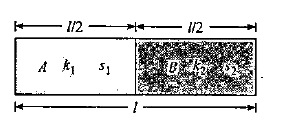A partition wall has two layers of different materials A and B in contact with each other. They have the same thickness but the thermal conductivity of layer A is twice that of layer B. At steady state the temperature difference across the layer B is 50 K, then the corresponding difference across the layer A is
50K
12.5K
25K
60K
Step by step video & image solution for A partition wall has two layers of different materials A and B in contact with each other. They have the same thickness but the thermal conductivity of layer A is twice that of layer B. At steady state the temperature difference across the layer B is 50 K, then the corresponding difference across the layer A is by Physics experts to help you in doubts & scoring excellent marks in Class 11 exams.
Updated on:21/07/2023Topper's Solved these Questions
Similar Questions
A wall has two layers A and B, each made of different material. Both the layers have the same thickness. The thermal conductivity of the material of A is twice that of B . Under thermal equilibrium, the temperature difference across the wall is 36∘C. The temperature difference across the layer A is
View SolutionA wall has two layers A and B, each made of different material. Both the layers have the same thickness. The thermal conductivity of the meterial of A is twice that of B . Under thermal equilibrium, the temperature difference across the wall is 36∘C. The temperature difference across the layer A is
View Solution
Knowledge Check
A partition wall has two layers of different materials A and B in contact with each other. They have the same thickness but the thermal conductivity of layer A is twice that of layer B. At steady state the temperature difference across the layer B is 50 K, then the corresponding difference across the layer A is
A50 kB12.5 kC25 kD60 kA partition wall has two layers A and B, in contact, each made of a different material. They have the same thickness but the thermal conductivity of layer A is twice that of layer B. If the steady state temperature difference across the wall is 60 K, then the corresponding difference across the layer A is
A10KB20KC30KD40KA wall has two layers A and B, each made of different materials. Both layers are of same thickness. But, the thermal conductivity of material A is twice that of B. If, in the steady state, the temperature difference across the wall is 24∘C, then the temperature difference across the layer B is :
A8∘CB12∘CC16∘CD20∘C
A wall has two layers A and B each made of different materials. The layer A is 10cm thick and B is 20 cm thick. The thermal conductivity of A is thrice that of B. Under thermal equilibrium temperature difference across the wall is 35∘C. The difference of temperature across the layer A is
View SolutionA composite slab consists of two parts of equal thickness. The thermal conductivity of one is twice that of the other. What will be the ratio of temperature difference across the two layers in the state of equilibrium ?
View SolutionA wall has two layers A and B each made of different materials. The thickness of both the layers is the same. The thermal conductivity of A, KA=3KB. The temperature different across the wall is 20∘C in thermal equilibrium
View SolutionA slab consists of two layers of different materials of the same thickness and having thermal conductivities K1 and K2. The equivalent thermal conductivity of the slab is
View SolutionA composite slab consists of two slabs A and B of different materials but of the same thickness placed one on top of the other. The thermal conductivities of A and B are k1 and K2 respectively. A steady temperature difference of 12∘C is maintained across the composite slab. If k1=K2/2, the temperature difference across slab A will be:

View Solution

